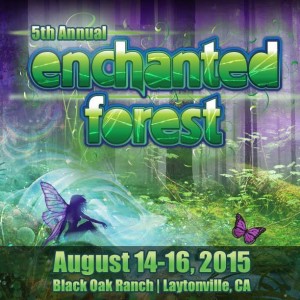With Enchanted Forest festival just around the corner, I’ve been thinking a lot about what it means to be enchanted by love… Enchantment has many definitions, including “to delight or captivate utterly; fascinate; charm” or “to impart a magical quality to” or even “to bewitch.”
Love as Enchantment
Love is perhaps the most enchanting of all human emotions and experiences. It can certainly bewitch us, it can captivate us, and it can delight us utterly. Love is also incredibly transformative, and it can be painful, challenging and bittersweet. But even with the difficulties of loving, the enchantment is always there… Even when we are suffering, it can be because we have opened ourselves to that enchantment which continues to dwell just below the surface.
For me, the most enchanting part of love is not being charmed by someone’s sexiness, being utterly captivated by their presence, or even being super turned on when you’re in the same room (although this is definitely fun and exciting!). For me, it is the ultimate enchantment to fully bare your soul to someone, to be completely honest about your sexuality, your identity, and your dreams, to keep nothing back, and to hold space for your partner to do the same. In my experience, there is nothing more fascinating or bewitching than to accept each other unconditionally, without judgment, and to know that you are in a safe place to express every aspect of yourself. It might not sound super sexy and glamorous, but this is where the real magic lies, at least in my experience.
Everyone has different needs, wants and desires. When it comes to our sexualities, so many of us have been conditioned by a lifetime of programming from our families, the media, religious institutions, our teachers (etc.) to believe our desires are wrong, shameful, unnatural, or irrational. And ironically, it is perhaps society’s own narrow programming and norms which might actually be irrational, or at least, highly unnatural for some. Feeling safe enough with your partner to break free from this programming and to pursue a lifestyle that feels GOOD and right to you is an unrivaled gift of magic and enchantment.
As a bisexual non-monogamous woman, and as a psychologist who specializes in relationships and sexuality, I have personally and professionally witnessed so many people who have sought out that safe place but who have been fearful to express their authentic sexuality to their partner(s). I certainly was one of those people, but my life has been transformed as I have been traveling on a magical, soul-baring, heart-exploding, crazy challenging and totally enchanted journey into polyamory with my partner Jimmy Ohm.
What is Polyamory?
Polyamory is an alternative to monogamy where people make a conscious choice to seek out multiple intimate partners in an ethical, responsible fashion. The term is derived from the Greek word “poly” (meaning many) and the Latin word “amor” (meaning love). In my understanding, polyamory is not about having a sex free-for-all without permission from your partners, nor is this an opportunity to be deceitful or a form of cheating: In our practice of polyamory, there is a strong emphasis on ethical and responsible behavior. For example, this means that we communicate about potential partners before we engage in any sexual intimacy or activities with them; we share mutual consent for all activities and connections involved; we are completely honest about how we feel; we budget our time accordingly; we respect each others feelings; and most importantly, we frequently communicate and check with each other.
I consider polyamory to be a sub-set of the broader category of “open relationships” where partners pursue emotional connections and sexual interactions with people outside of the relationship. Jimmy Ohm and I began our journey in an open relationship, where we would have sex with other couples, as well as bringing third parties (men or women, depending) into the bedroom with us. This was really great, incredibly liberating, enjoyable and most definitely enchanting, but we realized that we wanted more than just sex: We seek to build deep, spiritual connections with all of our intimate partners, and it sometimes requires we spend solo intimate time with outside partners to really build these bonds.
So a few months ago, we began to explore being in a polyamorous relationship. We are primary partners, meaning we are building a life together and tend to spend more time together: We have been together for several years, we own a home together, we live together, we work together, we own pets together and we spend the majority of our time together. In addition, Jimmy now has a secondary girlfriend and I have a secondary boyfriend. I imagine that when I meet the right person, I will also have a secondary girlfriend, too.
One very important distinction here is that to be secondary does not equate to being ‘second place’ in the amount of love, nurturing or enjoyment that partners have for each other. Rather the distinction is more descriptive, recognizing the hierarchical structuring of the relationship and the fact that primary partners tend to have more obligations and spend more time together, although this is not always the case (Note: This is not the only way to structure polyamorous relatioships, this is just what works for us. There are so many more considerations that go along with primaries and secondaries, Franklin Veaux’s polyamory site More Than Two does a fantastic job describing this if you would like to learn more.)
So, while the word “polyamory” is relatively new, termed sometime in the 1990’s, the concept is a very old one, possibly as old as humans themselves- In fact, there have been many arguments put forward (most notably in the brilliant and groundbreaking book, Sex at Dawn) suggesting that humans evolved in small forager group societies where everything as shared: The resources, the work-load the child-care and yes, even the sexual partners. According to this perspective, prior to beginning of the ‘agricultural’ way of life around 10,000 years ago, humans spent hundreds of thousands of years of our evolution living in small polyamorous groups. We can certainly look to the few remaining forager tribe societies today for support of this theory, as well as the undeniable reality that none of our close primate relatives are monogamous. There is so much more to say about this this theory, and you can listen into The Lucid Planet’s Polyamory 101 podcast to find out more, or check out Sex and Dawn.
Still, I am not here to tell you polyamory is any better than monogamy. It’s just what feels more natural for me and Jimmy, and this is part of the choices that partners get to make when they are feeling truly enchanted by love, and are free to express themselves without judgment. As divorce rates in the US move past 50% and the statistics on relational infidelity might be as high as 70% (depending on the statistics you view, and the fact that they are only measuring people willing to admit to cheating), many people are realizing that monogamy is not an option that works for them, or that is in not alignment with their highest self and their spiritual and emotional goals. But many of us do not have a proper frame of reference, or any socially acceptable media content, elders, or role models, to learn from about how to responsibly pursue alternatives to monogamy.
This is where Jimmy Ohm and I hope to make an impact for people who are seeking to explore polyamory and who don’t have the language to communicate about it yet, or they don’t have any idea where start. Last week we recorded this podcast for the Lucid Planet on Polyamory 101, and we have taken this topic on the road, presenting workshops on polyamory to our community at transformational festivals.
Our last event for the summer will be Enchanted Forest in Mendocino from August 14-16th, where you can catch me presenting on Sex as a Catalyst for Transformation on Sunday (the 16th) at 10am, and participate in our Poly 101 workshop on Sunday at 4:30 pm. In addition to the fantastic music line-up, epic cuddle puddles, incredible yoga and spiritual workshop offerings and the stunning forest and river environment filled with beautiful souls, at this festival you will have the opportunity to participate in a whole series of workshops about sexuality, with the intention of enhancing your sexual expression and connecting more deeply to yourself and your potential partner(s).
This is one of the first festivals I have attended where an entire series of workshops has been dedicated just to sexuality… Because they clearly understand what it truly means to be enchanted! (check out the sex workshop offerings here!)
Even though I am a social psychologist and I was a professor of sexuality for many years, neither Jimmy nor I is proclaiming to be an expert on this topic: We are only enthusiastic amateurs hoping that our story can serve as reference point, a guide, or as some kind of permission that yes, you CAN do this if it is what you truly desire. More than anything, we are here to create an open, sex positive and non-judgmental forum where we can help answer questions and to share our experiences. We have so much more to write and to say about the topic so please stay tuned, and in the meantime, listen to the Poly 101 podcast on Soundcloud and check out our tips below!
5 Tips from Poly 101:
- Be Honest, Even if it Hurts: If you try to hide the truth (even with good intentions of protecting your partner’s feelings), it will hurt them MORE when they find out than if you had just told them the truth from the start. Trust is so incredibly important to all relationships, and so to break the trust as you attempt to pursue open relationships or polyamory can be very damaging right from the outset. If you are afraid that your partner cannot accept your truth, then perhaps it is time to consider if this really is the right partner and the right relationship for you.
- Communicate Rigorously and Safely: Always check in with your partner, and be prepared to listen without reacting. You should both be able to express your feelings in safe place without the other person interpreting it as a personal attack, or feeling the need to defend themselves. The same goes for communicating your intentions, feeling and choices before pursuing them, especially in the early phases of opening up your relationship. Instead of coming home and saying “Hi honey, I just hooked up with so- and- so, I hope that’s ok,” start out by asking permission first: “Hi babe, I am attracted to so- and –so, how do you feel about me pursuing this?” Opening a dialogue is key.
- Remember, you do NOT have ownership: It is my belief that our possessions do not define who we are, nor do they truly belong to us. The same goes for our own bodies, which decay and die and get returned to the ‘rental-car’ facility at the end of life. In this way of thinking, we certainly do not have ANY ownership over our partners, whether it be their bodies, their sexuality, their identity, their expression, their feelings or their choices. Trying to control and dictate your partner’s wishes does not lead to a constructive and happy relationship. Respect and accept your partner’s feeling and choices as you wish yours to be respected. If you have a problem with their behavior, or even with their choice of partner, it is important to communicate this, but remember that the final decision is theirs.
- Fear Less, Love More: One of the most common questions we receive in our Poly 101 workshops is: “What happens if my partner falls in love with their other partner and leaves me completely?” to which we respond… If you ARE polyamorous, your partner won’t necessarily have to leave you, in the same way they would if you were monogamous. Plus, falling in love is a huge blessing! If your partner will be happier completely moving on with someone else, you can also respect that knowing this is what is best for you both. Letting go can be incredibly hard, but refer to #3 above… We do not have ownership over our partners or their feelings. We must also consider that the initial fear of sharing our partners is possibly derived from the scarcity programming that we are conditioned with in this world: The idea that there isn’t enough to go around… There is not enough money, not enough resources, not enough water or gasoline or energy or love! From a scarcity mentality, we should hold on to what is ‘ours’ so tightly that we would become unwilling to share it or let it go. But if you ‘mind-hack’ yourself, you can begin to identify the scarcity programming and change it to abundance programming, understanding that there is more than enough love to go around. I believe that there is an infinite amount of love in our world, and that the only truly limited resource that can become a problem is TIME. After all, you are able to have enormous amounts of love for many different people, aren’t you? Think about your family, your friends, your pets, or say, your favorite authors or musicians. Does loving one song preclude you from loving another song just as much? Does loving an additional partner take away your love from your original partner? Or does the freedom to explore and enrich your life with another partner actually enhance your love for all?
- Explore Compersion: If you have never heard of it, compersion is the opposite of jealousy: It is the feeling of happiness when your partner finds joy with another partner. Does this sound strange to you, or is it something you can easily imagine? It is true that we are conditioned to feel jealousy; some would even argue that our brains are hard-wired that way. Perhaps jealousy arises out of the programming of scarcity discussed above, of having to hold so tightly to what could be taken away from us. But imagine if instead of feeling jealous of your partner spending time or giving attention to another, you felt genuinely happy for their happiness? For me, practicing compersion has been a discipline, and initially I have found myself needing to re-train my thoughts and hold my tongue. Meditation practices, breathing, and focusing on gratitude has really helped me remain calm, re-organize my thought patterns, and find joy in sharing my partners. For some people, compersion comes very naturally. There are many different components of compersion, including not trash-talking your partner’s partner, being happy for your partner to experience new things (even if it happens without you), and being happy that other partners might be able to offer your partner things that you cannot. Compersion is a commitment and a practice, but I feel it is an absolutely essential part of practicing responsible polyamory.
If you’re looking for more, please listen to the Poly 101 Podcast and make your way to Mendocino August 14-16th for Enchanted Forest! Also for my next live show on Lucid Planet Radio when I return from the West Coast on August 26th, I will be interviewing Janet Hardy, co-author of the original groundbreaking book on sex and polyamory, The Ethical Slut. Stay tuned! Light and Love!
Cover artwork by: Alex Grey

